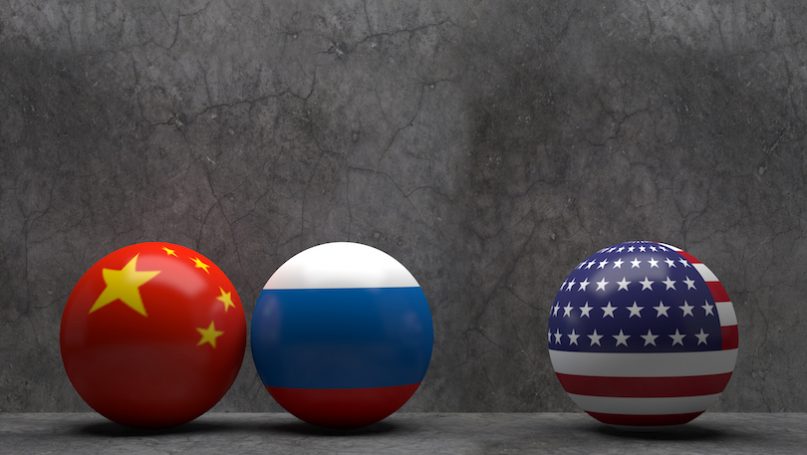
The Russian invasion of Ukraine has triggered a wave of declarations that we are entering a second cold war; these must be added to repeated claims before February of this year that the rise of China is doing the same thing. Are these assertions justifiable? In a word, no. It is possible that we are entering a new era of great-power rivalry, after 30 years or so of US unipolar preponderance, though this is not certain. But that does not mean that we should necessarily call a new season of geopolitical conflict between the US and China, or Russia, or both, a Cold War. The big European powers waged great-power politics during the nineteenth century, yet no one calls this conflict a Cold War.
For the term to have any precise meaning, it needs to be distinguished from great-power rivalries as such. We can do this in two ways. First, it was cold. By that we mean that the US and the USSR never went to war against one another; indeed, it came to an end without the ‘systemic’ war that normally characterises transitions from one international system to the next. Had the two superpowers gone to war over Berlin, or Cuba, or wherever, we would not be calling it a Cold War today, if anyone were still around to call it anything.
Why did it remain cold? Theorists like Kenneth Waltz stressed the stability of the bipolar system: the absence of alliance shifting and multipolar complexity made it relatively easy for the two superpowers to avoid war and maintain the existing order. Of course, the bipolar system turned out not be as stable as Waltz thought, since it collapsed about ten years after he made this claim. The better explanation, and one that Waltz himself came to embrace, was that it remained cold because Cold War leaders recognised that nuclear weapons made war insane, and chose to compromise (and eventually surrender, as the USSR did in 1991) rather than push matters beyond the brink.
Second, it was a war. By that we mean that it was a global showdown between two sides that advanced irreconcilable and universalist ideologies. As long as the other side still existed, in other words, the job was not done, and continued competition was unavoidable. Realists like Waltz portray the Cold War as just another example of great-power rivalry, but this is not quite right, because both sides could perceive that losing it would mean not just geopolitical defeat and the loss of great-power status, such as happened to, say, Austria-Hungary after World War One, but the global triumph of the other side’s ideology—which was precisely what occurred after the Soviet Union collapsed.
What we have today is similar, in the first sense, and very different, in the second. ‘Cold’ still applies insofar as the major powers continue to recognise that nuclear weapons make general war insane. We can see this at work in the US decision to announce that it would not defend Ukraine with direct military intervention, something that would have been unlikely and even bizarre in a pre-nuclear world, and, in a different way, in China’s long-standing policy of regarding nuclear war as unwinnable. Indeed, aversion to a nuclear World War three can explain the long period of US unipolarity: why bother building up forces to contend with the US if they can never be used?
What we do not have, today, is a ‘war’ as we did between 1945 and 1991. Russia no longer subscribes to a global, universalist ideology at all: its revanchist policies with respect to Ukraine and perhaps other bordering nations have nothing whatsoever in common with the Soviet ideology of worldwide socialism. China, on the other hand, still calls itself a communist country, but it has embraced globalised capitalism with both hands and is not interested in any way in spearheading socialist revolution across the planet. This is not to say that there are no significant ideological differences among the major nations: of course, there are. There were also significant ideological differences among, say, Britain, Russia, and Germany around 1900. But significant is not the same as irreconcilable.
Why then are we seeing the term thrown around so often? As with so many aspects of international relations today, this may be best explained by American domestic politics. Saying that we are entering a new Cold War is a tempting option for politicians keen to raise alarm and demonstrate their toughness, a tactic perfected in Washington over the past seventy years. It is gold for the Beltway ‘blob’ desperate to keep the US on a permanent interventionist footing. And, as Nicolas Guilhot has recently noted, it revives a reassuring good-vs-evil narrative that has been hit hard by the disastrous failures of US foreign policy since 2002. Don’t buy it.
Further Reading on E-International Relations
- Opinion – The Risk of Nuclear War with Russia
- Opinion – A Hidden Victory? The Winter War and Russia’s Invasion of Ukraine
- Opinion – Strategic Perspectives on the Russia-Ukraine War
- Opinion – The Unholy Alliance: Fossil Fuels and War
- Opinion – The NATO Madrid Summit and the Alliance’s New Dawn
- Opinion – A Psychological Perspective on Putin’s War with Ukraine